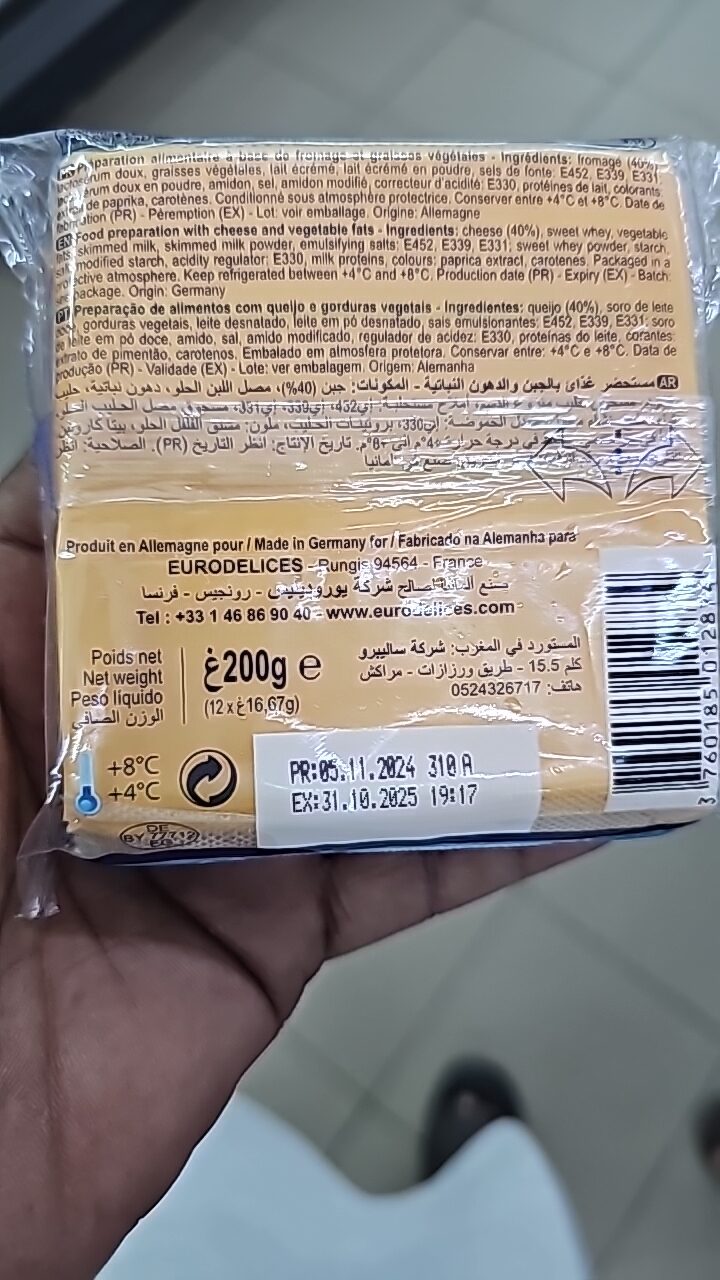
Barcode: 3760185012874
food preparation with cheese and vegetable fats
HALAL
📝 Reason: Based on the provided ingredients and Halal, Haram, Doubtful E-codes list, most additives are Halal, but possible use of animal rennet in cheese and whey, unspecified food colors, and generic acidity regulators make those ingredients Doubtful. According to Islamic law (Quran 5:3), avoidance of doubtful ingredients is encouraged without clear Halal certification.
🏷️ Category: Cheese, Dairy
📄 Certificates: 200G, Vegetarisch
Ingredients:
Details
Understanding the Halal Status of Food Preparation with Cheese and Vegetable Fats
The inquiry regarding the Halal status of a food product is crucial for many consumers. In this post, we explore whether the ‘food preparation with cheese and vegetable fats’ is Halal. From its primary ingredients to the complex E-numbers involved, we provide an in-depth analysis of the product’s compliance with Halal standards.
What is Halal?
Halal is an Arabic term meaning ‘permissible.’ It refers to food that is permissible in Islam according to Islamic law (Sharia). The Halal status of a product is determined not only by its ingredients but also by the processing methods and sources involved. Understanding these aspects can help consumers make informed choices.
Product Ingredients Breakdown
This product consists primarily of cheese (40%), sweet whey, and various fats and emulsifying agents. Below is a detailed analysis of each ingredient:
- Cheese (40%): The Halal status of cheese can be challenging as it often depends on the type of rennet used in its production. Traditional cheese may utilize animal rennet, which could render it Haram unless it is sourced from Halal-certified animals. Without clear certification, this ingredient is considered Doubtful. [Source]
- Sweet Whey: Similar to cheese, the Halal status of sweet whey is dependent on the milk processing methods. If animal-derived rennet is used, it raises concerns regarding its Halal compliance; thus, it is classified as Doubtful. [Source]
- Vegetable Fat: Generally considered Halal unless contaminated with Haram substances during processing. It is a safer choice for consumers. [Source]
- Skimmed Milk: From cows, this is classified as Halal if derived from permissible sources. [Source]
- Skimmed Milk Powder: Similar to skimmed milk, it is Halal if derived from Halal milk. [Source]
- Emulsifying Salts: E339 (Sodium Phosphate), E331 (Sodium Citrate), and E452 (Polyphosphates) are confirmed as Halal by numerous sources. [Source]
- Starch and Modified Starch: Typically derived from plants and considered Halal unless specific Haram substances are involved in their processing. [Source]
- Acidity Regulator: The status is indicated as Doubtful unless further details regarding its origin are provided. [Source]
- E330 (Citric Acid): Generally plant-based and Halal. [Source]
- Colors: The status of color ingredients can vary greatly, leading to a classification of Doubtful. More detailed information is often necessary for assurance. [Source]
- Paprika Extract and Carotenes: Both these ingredients are derived from plants and are categorized as Halal. [Source]
Conclusion
In conclusion, while the product ‘food preparation with cheese and vegetable fats’ largely comprises ingredients that could be considered Halal, the presence of potential uncertain elements like cheese and sweet whey makes this product fall into the Doubtful category overall. The key takeaway is to look for clear Halal certifications and avoid products with questionable ingredients to adhere strictly to Islamic dietary guidelines. By being informed and conscious about ingredients, consumers can better navigate their food choices.
